(Texts: All Artifacts, Color Coding, & Writings in Bold Type With Italics Inside Parenthesis, are Added by Editor R. Brown, not the Authors, Translators, or Publishers!)
(gods in blue … mixed-breed demigods in teal)
Esarhaddon, king of the world, king of Assyria, governor of Babylon, king of Sumer and Akkad,
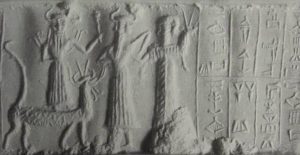 (Marduk & son Nabu with mixed-breed king by the hand)
(Marduk & son Nabu with mixed-breed king by the hand)
pious prince who reveres the gods Nabû and Marduk —
Before my time the great lord, the god Marduk, became angry, trembled (with rage),
and was furious with Esagil and Babylon; his [he]art was full of rage.
Because of the wrath in his heart and his bad temper, Esagil and Babylon became a wasteland and turned into ruins.
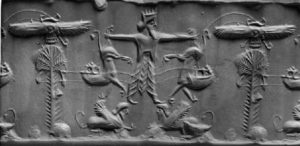
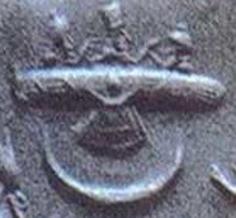 (Marduk; Inanna & two others board their sky-discs)
(Marduk; Inanna & two others board their sky-discs)
Its (Babylon’s) gods and goddesses became frightened, abandoned their cellas, and went up to the heavens.
The people living in it (Babylon) were distributed among the (foreign) riffraff (and) became slaves.
At the beginning of my kingship, in my first year, when I sat in greatness on (my) royal throne
(and) (when) they (the gods) entrusted me with the lordship of the lands,
the heart of the great divine lord, the god Marduk, was appeased, his mood was soothed;
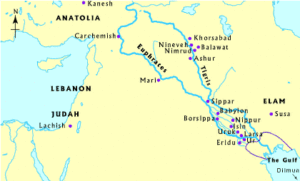 (modern man’s beginning in the land of the gods)
(modern man’s beginning in the land of the gods)
he became reconciled with Esagil and Babylon, (both of) which he had punished.
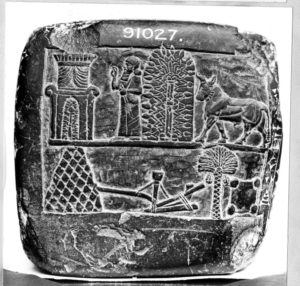 (giant semi-divine king Esarhaddon & Marduk’s temple residence)
(giant semi-divine king Esarhaddon & Marduk’s temple residence)
As for me, Esarhaddon, the servant who reveres his great divinity,
it occurred to [me] (and) my heart prompted me to (re)build Esagil and Babylon,
[re]novate (its) gods and goddesses, [comple]te (its) shrines, (and) (re)con[firm (its) sattukku offerings].
I was encouraged and ordered the (re)building.
I gathered the peoples of the lands conquered by me and had them take up hoe (and) basket.
I mix[ed] (the mud for) its re[v]etm[ent] with fine oil, honey, ghee, kurunnu-[wine], muttinnu-wine (and) pure mountain beer.
In order to show the people his great divinity and to inspire awe (in) his lordship,
I raised a basket onto my head and carried (it) myself.
I had its bricks made for a whole year in brickmolds of ivory, ebony, boxwood, (and) musukkannu-wood.
I built anew (and) [co]mpleted Esagil, the palace of the gods, together with its shrines, from its foundations to its battlements.
I made (it) greater than before, raised (it) up, glorified (it),
(and) made (it) glisten like the stars (lit. “writing”) of the firmament.
I filled (it) with splendor (making it) an object of wonder for all of the people.
I refurbished the gods and goddesses who lived in it (and) had (them) dwell on their daises as an eternal dwelling.
I (re)confirmed their inter[rup]ted sattukku offerings.
I had [whatever] furnishings [were ne]eded for Esagil [and] its [sh]rines
made from gold, si[lver], and bronze, and I placed (them) in their midst.
I had Babylon, (which was measured by) the aslu-cubit checked by the gods,
Imgur-Enlil, its wall, (and) Nēmed-Enlil, its outer wall,
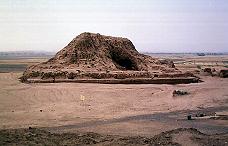
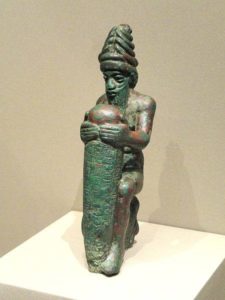 (Ningishzidda with foundation peg, the architect of the ziggurats)
(Ningishzidda with foundation peg, the architect of the ziggurats)
built anew with the work of the god Kulla (Ningishzidda) and I raised (them) like mountains.
I am the one who (re)built Babylon, (re)constructed Esagil, renewed (it) gods and goddesses,
completed (its) shrines, (re)confirmed (its) sattukku offerings, (and) who gathered its (Babylon’s) scattered people.
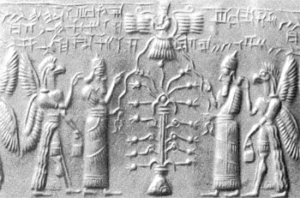 (son Enki, father King Anu in his sky-disc above, son Enlil, & eagle symbol for pilots)
(son Enki, father King Anu in his sky-disc above, son Enlil, & eagle symbol for pilots)
May the Enlil of the gods, the god Marduk, and the goddess Zarpanītu (Sarpanit), the queen,
look with joy upon the work of my good deeds and order the prolongation of my days,
(and) discuss my years to be many; may they decree as my fate the protection of my offspring,
the increase of my progeny, the expansion of my family so that they branch out widely;
like a father and mother, may they come over to my side in battle and warfare;
may they come to my aid; (and) may they make my weapons rise up (and) kill my enemies.
Let me attain whatever my heart desires (and) may they allow me to stand in victory
(and) triumph over my enemies; let me squash all of my enemies like ants;
let him (the god Marduk) make the foundation of the throne of my priestly office be as secure as a great mountain;
(and) let my reign endure as long as the foundations of Esagil and Babylon.
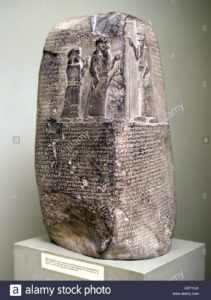 (giant semi-divine Babylonian king with spouse before god Marduk)
(giant semi-divine Babylonian king with spouse before god Marduk)
May all of the great gods who sit on daises in Babylon bless my kingship
until far-off days (and) may they order security for my reign forever.
[I had] foundation inscriptions made of silver, gold, lapis lazuli, alabaster, basalt, pendû-stone, elallu-stone,
(and) white limestone, (as well as) inscribed objects of baked clay, and (then) I wrote the might of the great hero,
the god Marduk, (and) the deeds that I (text: “he”) [had] done, my pious work.
[I p]laced (these inscriptions) in the foundations (and) left (them) for far-off days.
In future days, in far-off days, may one of the kings, my descendants,
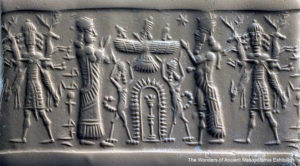 (giant mixed-breed king, Ninhursag & Marduk, Enlil, Anu, & Enki in sky-disc above)
(giant mixed-breed king, Ninhursag & Marduk, Enlil, Anu, & Enki in sky-disc above)
whom the king of the gods, the god [Mar]duk, names to rule [the land] and people,
[read] an inscription [written in] my name, and anoint (it) with oil, make an offering, (and) [re]turn (it) to its place.
The god Marduk, the king of the gods, will (then) hear his prayers.
(As for) the one who changes (an inscription) written in my name, defaces my representations, destroys my handiwork,
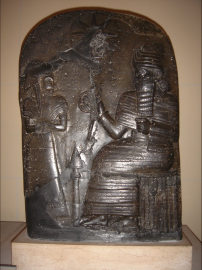 (Babylonian king & giant god Marduk, his rocket in-between)
(Babylonian king & giant god Marduk, his rocket in-between)
may the great divine lord, the god Marduk, glare at him angrily among all of the rulers,
and make his name (and) his descendant(s) disappear from the land.
May he have no pity on him forever.
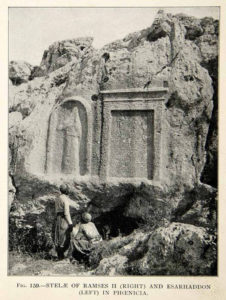 (tomb of Esarhaddon)
(tomb of Esarhaddon)
Accession year of Esarhaddon, king of Assyria.